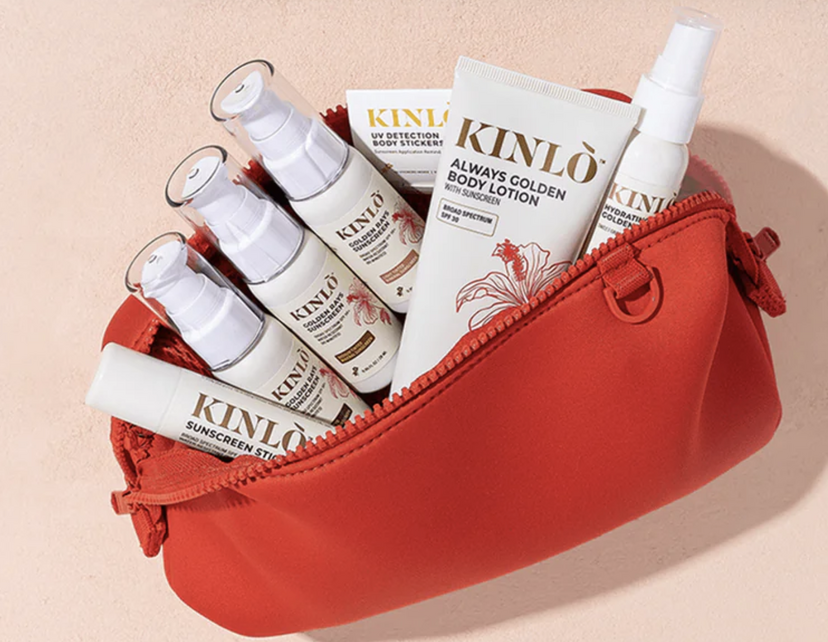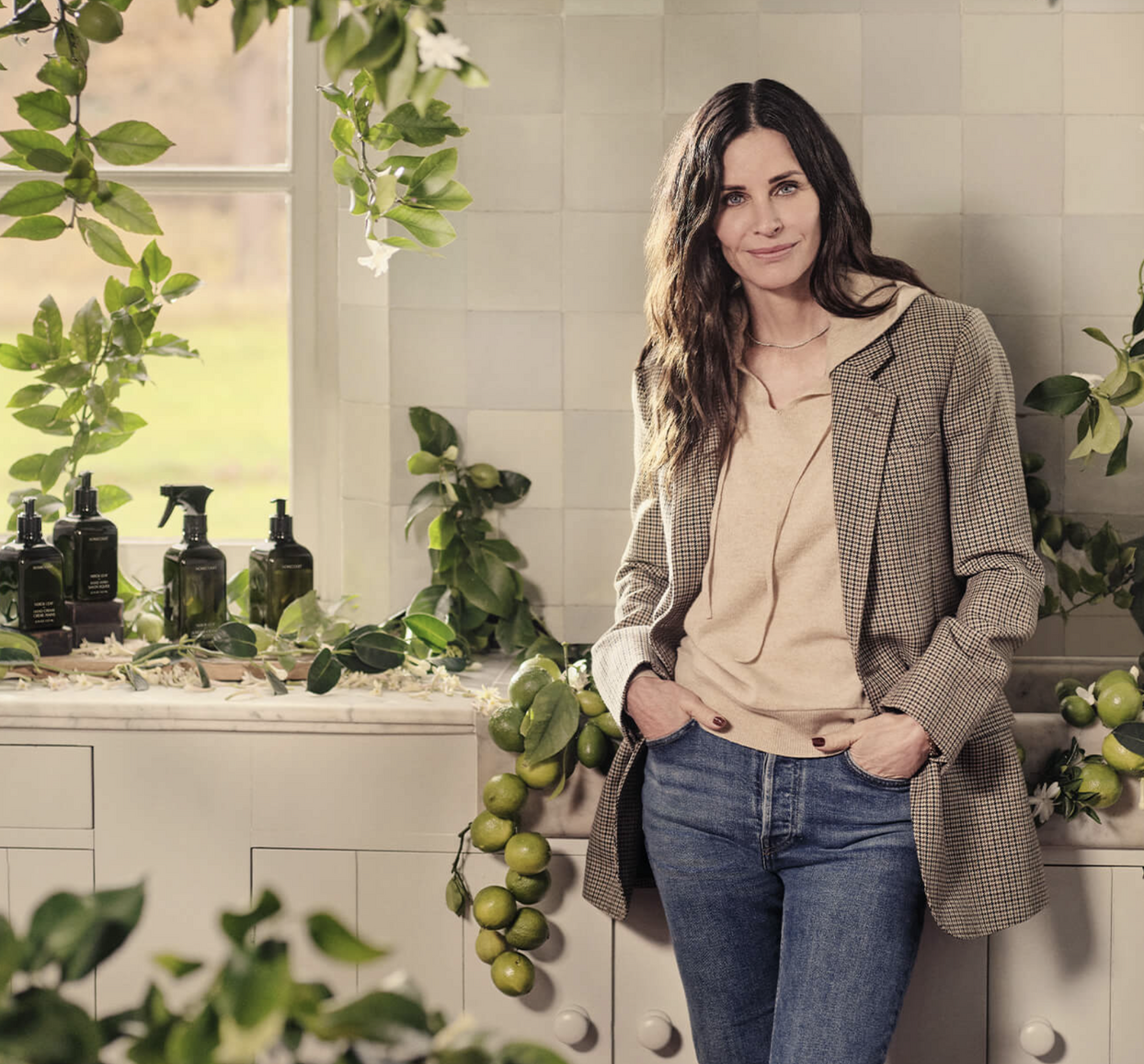
Executives Behind The Outset, Homecourt And Loved01 Tell Us How The Celebrity Brands Are Built For The Long Haul
Contrary to popular belief, not all celebrities think of beauty brands as cash grabs, according to executives behind celebrity beauty brands.
Three of those executives—Avantha Arachchi, COO at A-Frame Brands, the personal care and wellness incubator behind John Legend’s skincare brand Loved01, Naomi Osaka’s sun protection brand Kinlo, and Dwyane Wade and Gabrielle Union’s baby care brand Proudly; Kate Foster, co-founder and CEO of Scarlett Johansson’s skincare care brand The Outset; and Sarah Jahnke, co-founder and CEO of Courteney Cox’s home care brand Homecourt—emphasized during a Beauty Independent In Conversation webinar last week that the celebrities they work with are out to create brands that resonate with consumers over the long haul. To do so, they’re partnering with experienced industry insiders who can scale successful businesses.
“At the end of the day, these people are entrepreneurs and brand builders to be able to get to the level of celebrity that they’re at,” said Arachchi. “They know what their consumers want, and they want to be able to give it to them.” Foster highlighted how Johansson’s skill set complements her operator skill set. She said, “She’s a creative visionary and a great storyteller. I can tend to be more of a linear thinker who’s factual and objective. She really kind of gets to the heart of the issues very, very quickly.”
In addition to her co-founder’s passion for fragrance, Jahnke applauded Cox’s keen eye for design as an essential asset in determining Homecourt’s brand identity. “She has a history of making amazing real estate deals, flipping homes and redecorating. She has such a point of view, which from a branding perspective was super important,” she said. “It really guided us to where we are today.”

Brand Rationale
After selling her product recommendation platform SwearBy to the media company Meredith in 2020, Foster was looking to take a break from the startup world. However, when the chance to meet with Johansson arose, she cautiously decided to take it.
“As an exited founder, you kind of know what the ingredients for success are,” said Foster. “I felt like there was the problem-solution larger market trends, and then also a very dedicated and talented founder who was committed to bring this idea to life. Any skepticism that I had instantly evaporated when I saw the tremendous potential for this business.”
Homecourt was conceived as a celebrity lifestyle brand focusing specifically on candles. Upon meeting Cox for the first time in September 2020, Jahnke detected it had an opportunity to extend to a full portfolio of home care products that would embody Cox’s aesthetic and disrupt the traditional cleaning category.
“The cleaning category is dusty, commoditized and utilitarian,” said Jahnke, former head of marketing for Viktor&Rolf and Proenza Schouler fragrances at L’Oréal. “It could really use an upgrade, and I’m the right person to bring a luxury beauty brand and fragrance philosophy to it.”
Former senior people operations manager at Tatcha, Arachchi was consulting for A-Frame, which founder Ari Bloom launched in 2019, prior to joining it as COO full-time in 2021. She said, “It felt impactful, and it was what I built the majority of my career on, which is a passion for diversity and the idea that diversity has value and that it can be your superpower.
The celebrity angle was integral to A-Frame’s model from the get-go as a strategy to imbue its brands with credibility. Arachchi explained, “We found that attaching trusted people within the community who are also passionate about solving problems enables us to get higher levels of consumer adoption.”

DISTRIBUTIOn Strategies
Grounded in Johansson’s struggles with adult acne, The Outset positions itself as a prestige barrier-protecting skincare brand gentle enough to be used by people with any skin type. It launched across Sephora’s store network in the United States a year after its direct-to-consumer debut. It’s since branched out to Goop, Nordstrom, Heyday and Cult Beauty.
The Outset’s Sephora debut taught it some hard lessons about the importance of communicating about product effectiveness. “The message clarity has to come through really, really quickly and powerfully at Sephora,” said Foster. “I think that that was one thing that has taken us time to be able to get to, particularly when we’re kind of more of this ethereal, minimalist brand. You have to still lead with the efficacy.”
At A-Frame, the objective is to develop affordable brands appropriate for large national retailers. The incubator secured retail partnerships for its brands before they launched: Target for Proudly, Walmart for Kinlo, and CVS and Walmart for Loved01. Arachchi said, “If we’re trying to solve problems for these consumers, we need to make sure that those products are in their hands.”
Although it has a retail-first approach, A-Frame develops a robust DTC presence for its brands, too. Arachchi said, “To see these communities develop digitally and really catapult these DTC brands head to head with national retail is crazy to me.”
To Jahnke, Homecourt is sitting on the precipice of an entirely new category straddling home and beauty. The brand’s dish soaps, surface sprays and hand washes were formulated to comply with Sephora’s clean beauty standards, and its prestige positioning is targeted at a consumer who values cleaning as a form of self-care.
Jahnke said, “I’m truly just riding this wave that, yes, my surface spray is $22, which is about five times the price of Mrs. Meyers, but it’s still an affordable luxury.”
Launched in DTC in early 2022, Homecourt has expanded to 30 independent boutiques around the country. Jahnke is hopeful that partnerships with major beauty retailers will follow. She said, “My vision is that, in the future, you will be buying your household products at Sephora and Ulta and in the beauty department at Nordstrom.”





Leave a Reply
You must be logged in to post a comment.